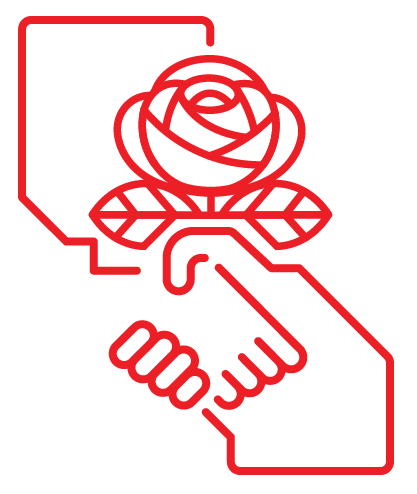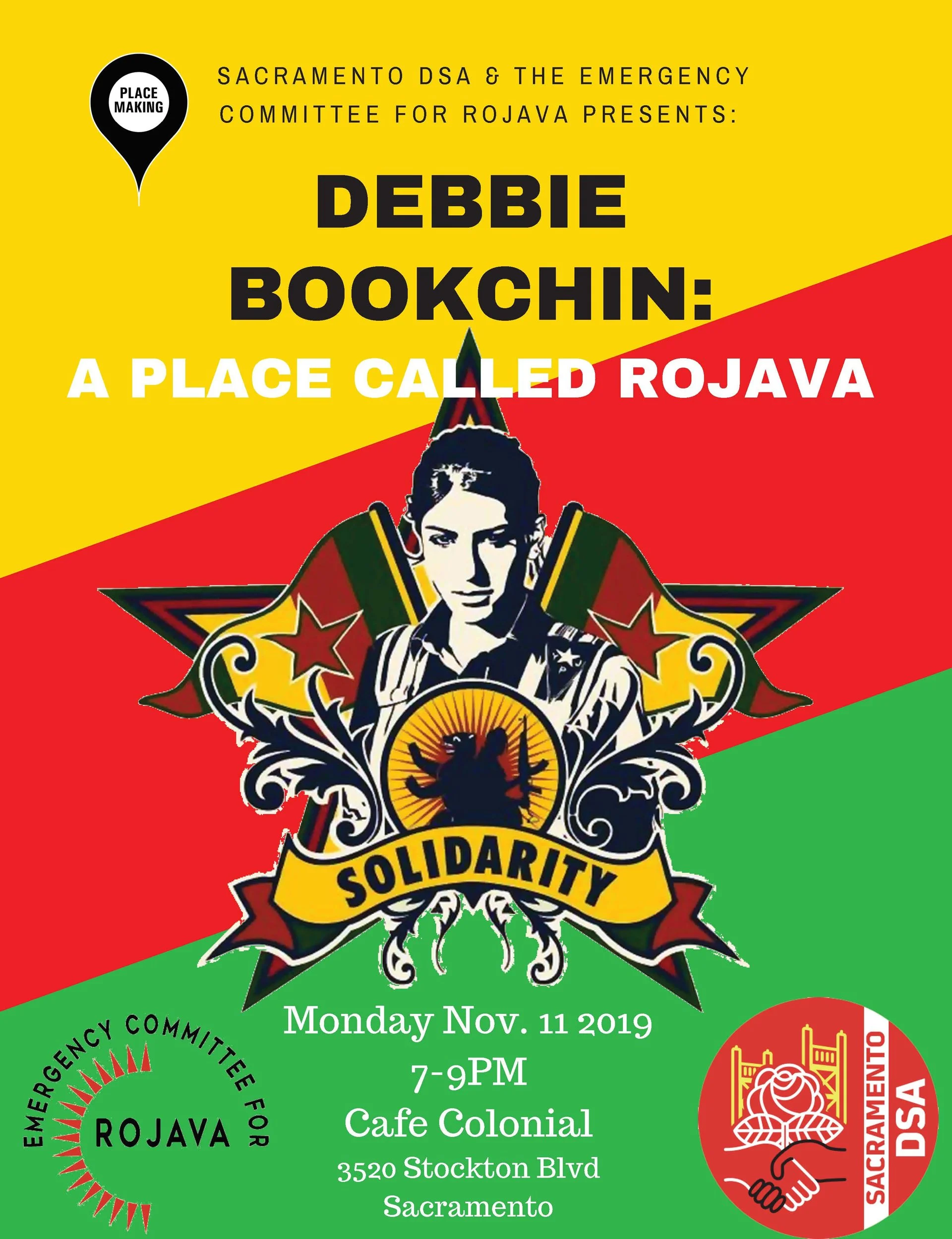Notes on socialist education in the Sacramento Valley
Members of the Sacramento DSA Education Committee with author/activists Hy Thurman and Kwame Shakur.
Like many DSA chapters, our various committees in Sacramento have seen surges and ebbs, depending upon what’s happening in the political life of our community. One initiative that has remained vibrant has been our political education committee. We see political education offering many different contributions and functions in the life of our chapter.
First, it brings together our membership as a whole to learn, analyze, and discuss various ideas and practices from different aspects of our work as a socialist organization. While DSA can be somewhat splintered along committee lines, including mutual aid, union work and housing, among others, large-scale public events can be helpful to bring comrades together to establish a common understanding and framework for political work overall. These events help to contribute to organizational community-building and a shared social structure.
Secondly, our political education events are outwardly-facing, and offer good opportunities to bring in members of the public who might not want to join DSA outright, but want an opportunity to attend an event where other members of the public will be present. These events are great opportunities to invite friends, contacts, and acquaintances to a gathering they would feel comfortable attending.
Thirdly, organizing public events are a great way to build alliances with other movements and to share our common ideas and struggles to build solidarity with like-minded comrades outside the orbit of DSA.
We have concentrated on two distinct types of events: large public events with speakers, films, performances, book talks and discussions; and our night school, which offers a variety of classes that are more in-depth.
Feminist author/activist Silvia Federici packed in an audience of two hundred for her presentation organized by the Sacramento DSA Education Committee.
Night Schools
We typically hold our night schools in classrooms in a community center that used to be a school. The location feels like a school, with typical classroom seating with the swiveling arm rests for notetaking. On average these classes have brought in approximately 40 students each. We typically schedule classes in a one-month period, with a class meeting once every week, say on every Thursday of that month. We encourage people to register in advance, and we often distribute a reading ahead of time for each class.
We have played with the idea of having some kind of “passport” booklet to stamp for every class, and once someone has enough stamps they earn a “diploma” just to make it fun. Some of our classes have included curriculum on racism, imperialism, electoral strategies, queer activism, Marxism, labor strikes and much more.
Larger public events
Our public events are often geared towards bringing in a larger audience with a more eclectic program than classes. We have had dinners, speakers, films, music, artwork, and a range of educational and cultural offerings. Our evenings have featured Silvia Federici on feminist theory, Hy Thurman and Kwame Shakur on multiracial unity, Debbie Bookchin on the struggle in Rojava, Roxanne Dunbar-Ortiz on Native American history, Mat Calahan on the politics of music, Max Elbaum on movement building, Fred Glass on labor history, and Bob Wing on Asian-American activism, among others.
We try to tie our educational subjects into the work that our committees are doing. For example, we presented labor activist Jane McAlevey (Rest in Power!) with our labor committee at a reading we sponsored at a local bookstore. We worked with our International Committee to co-sponsor a teach-in on Palestine.
During the COVID shutdown we offered online classes such as queer theory, pirate radio, and immigrant rights. Most recently we featured the new film Open Country (produced by two Sacramento DSA members), a radical reinterpretation of North American country music, which opened with a country music performance by DSA members and friends. The money raised from this screening is going toward procuring a grave marker memorial for Aunt Molly Jackson, a singer/songwriter from the Bloody Harlan mine wars who is buried in an unmarked grave in Sacramento.
Community outreach
It’s important to bring in community activists who are not necessarily DSA members, including activists and organizers we feel would benefit our movement as a whole. Billy X Jennings from the “itsabouttime” Black Panther archive spoke about the role of the Black Panther Party and the importance of preserving the people’s archive. We reached out to the broader women’s movement for Silvia Federici’s talk, to strengthen our connections to those working exclusively on sexuality and gender issues. Silvia’s talk drew more than 200 people, which reinforced the importance of reaching out beyond our membership.
Roxanne Dunbar-Ortiz’s talk was co-sponsored by local activists involved in protesting the pipeline projects and also brought in a large, overflow crowd. A new project we have undertaken is to host “international cafes” where we bring activists working in different parts of the world to give updates on current situations in those regions. Our “café” on Central America, for example, highlighted the work of four activists from the region. Almost without exception these events have been standing room only.
Sacramento DSA Education Committee flyer for Rojava event
The importance of political education
Historically political education has been a central part of organization building. The Communist Party (CPUSA) had many worker schools throughout the country that emphasized political education among the working class. The Black Panther Party relied heavily upon political education to integrate young recruits into the movement. DSA should place a strong priority on political education to strengthen the three aspects we have highlighted so far: education and integration for our members, bringing in interested possible recruits, and strengthening ties with other movement organizations.
We would like to see our political education initiatives focus on publishing printed materials for our public outreach and tabling work, which we see as very lacking. We would like to propose a shared initiative around printing and distributing this material, which would benefit all of us in every chapter. This would greatly accelerate our efforts to reach the public with inspirational ideas that will fuel a strong socialist movement. Let our motto be: Each One, Teach One!



